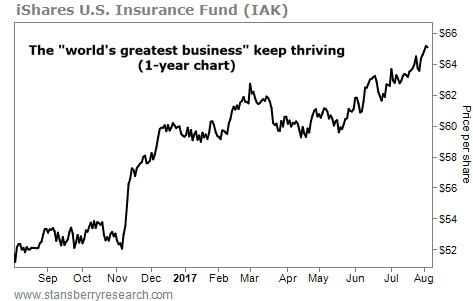| Home | About Us | Resources | Archive | Free Reports | Market Window |
Don't Fall Into the Middle-Class TrapBy
Friday, August 4, 2017
I thought I knew what "middle class" meant.
I took it to mean most of working America: plumbers, electricians, teachers, police officers, nurses, lawyers, etc.
And had you asked me how many Americans made up the middle class, I'd have guessed it was at least 50%.
But according to Charles Hugh Smith, who authors the excellent Of Two Minds blog, that's not so...
The actual number of middle-class Americans has dwindled over the years. Today, he says, "middle class" describes only 10% of U.S. households – the 10% just below the richest 10%. Per Smith...
Outside of income, he includes these criteria in his definition of middle class: good health insurance, 25%-50% equity in a home, the ability to save at least 6% of your income, lots of money in a 401(k) or IRA, the ability to cover your debt and expenses if one of your household's primary wage earners loses his or her job, reliable vehicles for each wage earner, no reliance on government assistance, "generational wealth" (in the form of heirlooms, precious metals, etc.) that you can hand down, the ability to invest in kids (education, clubs, training, etc.), and leisure time for physical, spiritual, and mental fitness. Do you meet all of these criteria?
Don't feel bad if the answer is no. I doubt 50% of the population could ever pass his tough test.
But the general point – that the middle class is smaller than it was during my childhood – rings true.
According to think tank Pew Research Center, net worth has risen only in the upper 10% of the population for the past 40 years.
Median wages, meanwhile, have been flat. And even with a more liberal definition of middle class, households that meet that criteria have dropped by 11%.
This has happened for many reasons. Much of it has to do with an unhealthy alliance between big government and Wall Street.
What can you do about it?
My view is that there is very little you can do that will make a significant difference. Yes, you can sign petitions and write letters and vote, but the relationship between all that sort of "political" activity and the economy is small and almost always long term.
If you want to make a significant, shorter-term difference for yourself and your family, I suggest the following:
Stop complaining. Turn off the news. Unplug from social media. You and you alone are responsible for the health and state of your finances, so quit messing around. Now is the time for you to spend your "leisure hours" doing something productive.
If you are an employee, you need to become a better, more valuable one. If you are a plumber, lawyer, electrician, doctor, etc., you need to acquire more customers and learn how to double or triple your hourly rate. If you are a business owner, you have to grow your business. And while you do that...
Be a wealth builder instead. Growing wealth is about much more than buying and selling stocks. It's about increasing your net worth by investing in income-producing assets. It's about creating secondary and tertiary cash streams, understanding how to diversify your investments, and avoiding wealth-siphoning expenses. Increasing your net worth requires much more than good stock picks.
Figure out what those requirements are, and get to work.
Regards,
Mark Ford
Further Reading:
"It is still possible for ordinary, wage-earning Americans to become wealthy," Mark writes. He explains how a few simple principles can help you build real wealth – without scrimping and saving. Learn more here.
Many retirement-age Americans have worked hard, but they still have serious worries about money. In this essay, Mark shares why it's not too late to create an attractive retirement. Read more here.
Market NotesCHECKING IN ON THE 'WORLD'S GREATEST BUSINESS' Today's chart highlights the insurance sector...
Longtime readers know Stansberry Research founder Porter Stansberry believes that insurance is the best business in the world. These companies collect premiums from customers and earn investment returns on that capital. The best firms pay out less in claims than they receive in premiums. Porter has argued that insurance firms can be especially successful in times of inflation – and during big bull markets, like the one we're seeing today...
For proof of this idea, we'll look at shares of the iShares U.S. Insurance Fund (IAK)... The fund holds a basket of 62 U.S.-based insurers, which offer to protect everything from your life and home to your cars and boats. Its top holdings include industry leaders like Chubb (CB), MetLife (MET), and Travelers (TRV).
As you can see from the chart below, it has been a good year for insurance stocks. IAK shares are up about 25% over the past year, and they're hitting new all-time highs. It's more proof that insurance is one of the world's greatest businesses – especially right now...
 |
Recent Articles
|



